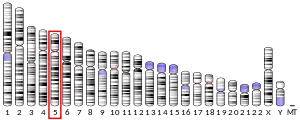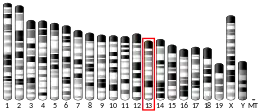ADAMTS6
ADAM metallopeptidase with thrombospondin type 1 motif 6 is a protein that in humans is encoded by the ADAMTS6 gene. [5]
| ADAMTS6 | |||||||||||||||||||||||||||||||||||||||||||||||||||
|---|---|---|---|---|---|---|---|---|---|---|---|---|---|---|---|---|---|---|---|---|---|---|---|---|---|---|---|---|---|---|---|---|---|---|---|---|---|---|---|---|---|---|---|---|---|---|---|---|---|---|---|
| Identifiers | |||||||||||||||||||||||||||||||||||||||||||||||||||
| Aliases | ADAMTS6, ADAM-TS 6, ADAM-TS6, ADAMTS-6, ADAM metallopeptidase with thrombospondin type 1 motif 6 | ||||||||||||||||||||||||||||||||||||||||||||||||||
| External IDs | OMIM: 605008 MGI: 1347348 HomoloGene: 82573 GeneCards: ADAMTS6 | ||||||||||||||||||||||||||||||||||||||||||||||||||
| |||||||||||||||||||||||||||||||||||||||||||||||||||
| |||||||||||||||||||||||||||||||||||||||||||||||||||
| |||||||||||||||||||||||||||||||||||||||||||||||||||
| |||||||||||||||||||||||||||||||||||||||||||||||||||
| |||||||||||||||||||||||||||||||||||||||||||||||||||
| Wikidata | |||||||||||||||||||||||||||||||||||||||||||||||||||
| |||||||||||||||||||||||||||||||||||||||||||||||||||
Function
This gene encodes a member of the ADAMTS (a disintegrin and metalloproteinase with thrombospondin motifs) protein family. Members of the family share several distinct protein modules, including a propeptide region, a metalloproteinase domain, a disintegrin-like domain, and a thrombospondin type 1 (TS) motif. Individual members of this family differ in the number of C-terminal TS motifs, and some have unique C-terminal domains. The encoded preproprotein is proteolytically processed to generate the mature enzyme. Expression of this gene may be regulated by the cytokine TNF-alpha.
References
- GRCh38: Ensembl release 89: ENSG00000049192 - Ensembl, May 2017
- GRCm38: Ensembl release 89: ENSMUSG00000046169 - Ensembl, May 2017
- "Human PubMed Reference:". National Center for Biotechnology Information, U.S. National Library of Medicine.
- "Mouse PubMed Reference:". National Center for Biotechnology Information, U.S. National Library of Medicine.
- "Entrez Gene: ADAM metallopeptidase with thrombospondin type 1 motif 6". Retrieved 2017-09-01.
- Jorgenson, E.; Makki, N.; Shen, L.; Chen, D. C.; Tian, C.; Eckalbar, W. L.; Hinds, D.; Ahituv, N.; Avins, A. (2015). "A genome-wide association study identifies four novel susceptibility loci underlying inguinal hernia - PubMed". Nature Communications. 6: 10130. doi:10.1038/ncomms10130. PMC 4703831. PMID 26686553.
Further reading
- Bevitt DJ, Li Z, Lindrop JL, Barker MD, Clarke MP, McKie N (2005). "Analysis of full length ADAMTS6 transcript reveals alternative splicing and a role for the 5' untranslated region in translational control". Gene. 359: 99–110. doi:10.1016/j.gene.2005.06.011. PMID 16129570.
- Sakai N, Terami H, Suzuki S, Haga M, Nomoto K, Tsuchida N, Morohashi K, Saito N, Asada M, Hashimoto M, Harada D, Asahara H, Ishikawa T, Shimada F, Sakurada K (2008). "Identification of NR5A1 (SF-1/AD4BP) gene expression modulators by large-scale gain and loss of function studies". J. Endocrinol. 198 (3): 489–97. doi:10.1677/JOE-08-0027. PMID 18579725.
- Rose JE, Behm FM, Drgon T, Johnson C, Uhl GR (2010). "Personalized smoking cessation: interactions between nicotine dose, dependence and quit-success genotype score". Mol. Med. 16 (7–8): 247–53. doi:10.2119/molmed.2009.00159. PMC 2896464. PMID 20379614.
This article incorporates text from the United States National Library of Medicine, which is in the public domain.



